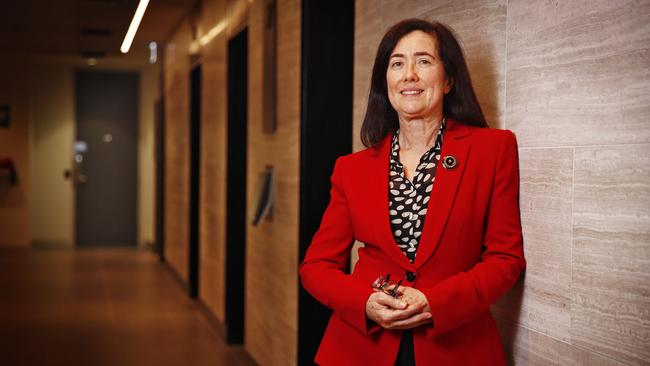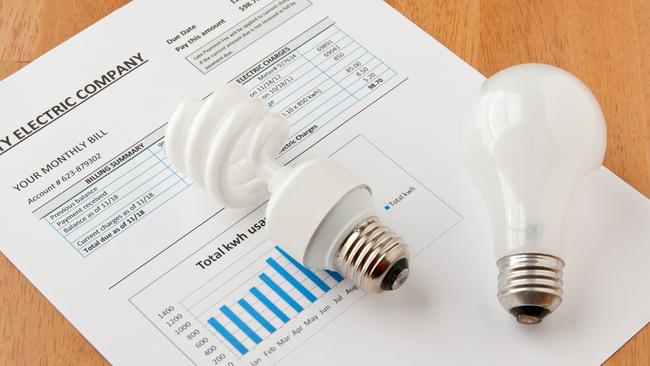Energy, telcos in ACCC sights for price gouging
The two sectors are firmly in the sights of competition boss Gina Cass-Gottlieb over the coming year as households face bill shock.

Business
Don't miss out on the headlines from Business. Followed categories will be added to My News.
The competition regulator will target surging prices across energy and telecommunications and other essential services as it looks for signs of gouging or conduct that hurts consumer choice as households face a jump in the cost of living.
The two sectors are firmly in the sights of Australian Competition and Consumer Commission chair Gina Cass-Gottlieb over the coming year as she looks for any signs operators are taking advantage of consumers, particularly when it comes to a jump in electricity and gas prices.
“In the current circumstances of rising cost of living, Australian consumers are even more vulnerable to the effects of anti-competitive conduct that reduce competition in the supply of essential services, restricting entry or expansion of competitors, reducing choice and contributing to price escalation pressures,” Ms Cass-Gottlieb said.
She said misleading sales pitches in relation to the price, features or benefits of essential services such as energy or NBN offers prevent consumers from making informed purchasing decisions.
“It’s particularly important that consumers and businesses can make informed decisions about what services are right for them in relation to price and the quality of the service that is provided when they are struggling with shrinking household budgets,” she said.

Ms Cass-Gottlieb issued the warning as part of a speech spelling out the priorities for her agency this coming year. It marks her first address on enforcement priorities since the top competition lawyer took charge from former ACCC boss Rod Sims nearly a year ago.
In other areas targeted the ACCC will continue its crackdown on “greenwashing” or companies making environmental claims that don’t stack up or have little evidence to support it. It also plans to further its investigation into social media influencers who fail to disclose their advertising connections. Manipulative and deceptive practices in connection with digital services will continue to come under scrutiny, including “dark patterns” or manipulative sales techniques.
This could range from hurdles in trying to unsubscribe from a paid service, to the using of our own data to exploit our individual characteristics in making a sale,” Ms Cass-Gottlieb said.
“We are also concerned about the manipulation of online reviews and search results, and the use of algorithms to achieve this manipulation, as well as comparison websites and social media influencers who don’t disclose commercial relationships, including paid promotions,” she said.
Price caps
One area expected to take up substantial activity is the monitoring of the Albanese government’s emergency gas price caps. The ACCC has started reporting on the conduct of gas market producers and developing an enforceable code of conduct for the industry.
At the same time it has commenced an investigation into how banks run the retail deposits, in the wake of claims lenders aren’t passing on the benefit of interest rate rises to savers. This inquiry will also look at whether banks are making it hard to switch in and out of savings products.
“These are critically important issues, particularly for those Australians who rely on interest paid on deposit and savings accounts to supplement their income from employment, superannuation and the pension,” Ms Cass-Gottlieb said.
On greenwashing, the ACCC last week released the results of a sweep that found 57 per cent of the businesses reviewed in the sweep made concerning claims about their environmental credentials. The cosmetic, clothing and footwear and food and drink sectors were found to have the highest proportion of suspect claims.
“This is concerning because consumers and businesses are more focused on sustainability to inform their purchasing decisions and are often prepared to pay more for sustainable practices,” Ms Cass-Gottlieb said.
Businesses using broad claims like environmentally friendly, green, or sustainable are obliged to back up these claims through reliable scientific reports, transparent supply chain information, reputable third-party certification or other forms of evidence, she said.
“Businesses must be able to provide robust evidence for their claims and if unable to do so, then these claims should not be made”.
Ms Cass-Gottlieb said there will be continuity in the ACCC’s work program even though there has been change at the top. Mr Sims, who retired last March, developed a reputation for legal action to enforce competition rules, a move that resulted in hundreds of millions of penalties issued against companies.
Last year the ACCC secured $200m in penalties, including $60m from tech giant Google for misleading representations and a further $21m from ride sharing group Uber.
Originally published as Energy, telcos in ACCC sights for price gouging



